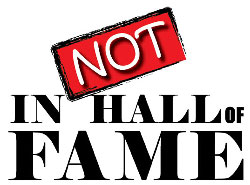
Committee Chairman
Kirk Buchner, "The Committee Chairman", is the owner and operator of the site. Kirk can be contacted at [email protected] .
RIP: Gilles Tremblay
Nov 27, 2014
Published in
Not in Hall of Fame News
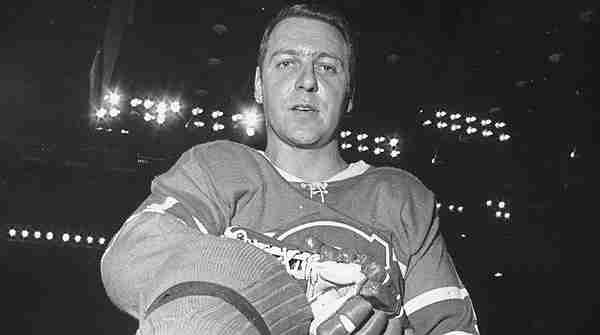
It was announced today that former four time Stanley Cup Champion Gilles Tremblay died today at the age of 75.
Known for his two-way skill, Tremblay played nine seasons in the National Hockey League, all of which were the Montreal Canadians. Over a 506 Game career, Tremblay accrued 330 Points and another 23 in the Playoffs and is one of the rare players to own four Stanley Cup Rings.
The former Left Winger would go on to a successful career in broadcasting on the French language broadcasts of Montreal Canadians games. He would win the Foster Hewitt Award for excellence in broadcasting in 2002.
We here at Notinhalloffame.com would like to extend our condolences to the friends and families of Gilles Tremblay at this time.
Barry Bonds: "Induction Coming"
Nov 25, 2014
Published in
Not in Hall of Fame News
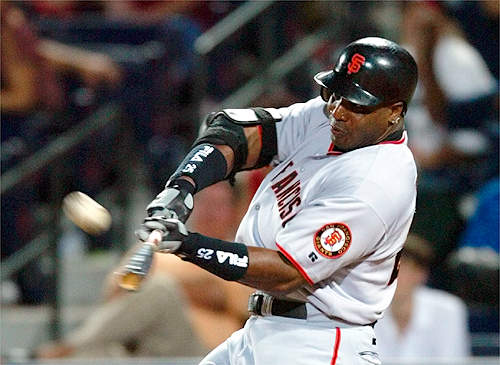
As you may have already heard (and if you are visiting this website, we strongly suspect that they you have) the Baseball Hall of Fame has officially issued their Hall of Fame ballot, though anyone who follows the Cooperstown based Hall knows that the ballot contains no surprises.
The biggest name (in our eyes) on the ballot is Barry Bonds, the man who holds the all time record for Home Runs in the Majors, is without question (along with Roger Clemens), the most controversial. Bonds, is entering his third year on the ballot and though he only received 34.7 % on last year’s ballot (down from 36.2% from his first year) still feels confident that he will get inducted.
In an interview with MLB.Com, Bonds had a few interesting things to say in regards to the Baseball Hall of Fame and his chances of induction:
“I deserve to be there…Clemens deserves to be there. The guys that are supposed to the there, period. I don’t even know how to say it. We are Hall of Famers. Why are we having these conversations about it? Why are we talking about a baseball era that has come and gone? Era, era, era. Do the best players deserve to be in the Hall of Fame? Yes. Everything that everyone has accomplished in baseball is in that (record) book. Correct? So if that’s correct, then we need to be in there. End of story.”
We are not going to focus on the statistical element here. Anyone following Baseball knows the credentials of Barry Bonds, Roger Clemens and those associated with PEDs; caught or not. What we want to focus on is the word “era”, which had been brandished about by us here at Notinhalloffame.com.
The “era” in which Bonds speaks of is when PEDs were not governed by Major League Baseball and allegedly the majority of baseball players were partaking in their use. It was not until 2004 when MLB formally adopted a policy against it, and rather than go onto long winded discussions on the Mitchell Report and what Selig knew and did not know, we understand what Bonds meant, and we suspect that even the detractors of the former slugger understand his meaning.
Saying that, Bonds still gave words that gave confidence in regards to eventual induction:
“I love Major League Baseball. I always have and I loved playing the game. I don’t have any doubts that I’ll get there in time. I’m bothered about it, but I don’t sit here going, ‘I’m not going to make it’. I don’t see how it stays the way it’s going. In my mind, in my head, I’m a lot more positive about it than I am negative. I think eventually they’ll do the right thing.”
Hmmm. That is a lot of optimism for someone who has seen nobody in his situation sniff the Baseball Hall of Fame. We will say that we appreciate Barry Bonds’ statement that he does care; in an “era” where players such as him pretend not to care.
We know this much. Barry Bonds and those associated with his stigma are not getting this year or any year soon, though we do appreciate that he is not pretending to not care like others in his situation.
We also know this much: the Baseball Hall of Fame will remain controversial and Bonds, Clemens etc. will pop up in articles like this for years to come.
RIP: Pat Quinn and Viktor Tikhonov
Nov 25, 2014
Published in
Not in Hall of Fame News
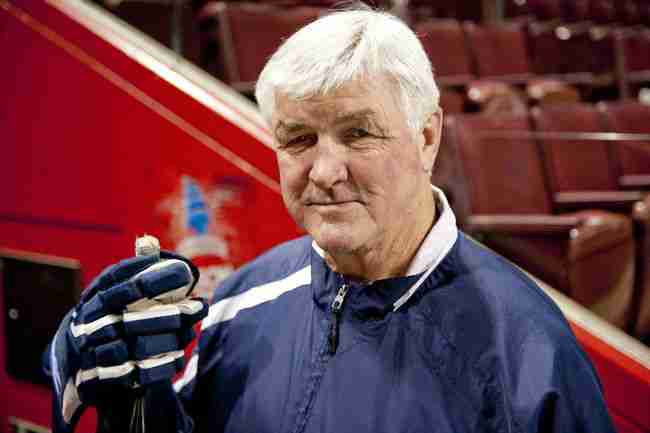
It is a sad day in the world of hockey as both Pat Quinn and Viktor Tikhonov passed away today, both legends in the world of coaching the game of hockey.
Pat Quinn carved a decent niche in the National Hockey League where he played nine seasons on the blue line for the Toronto Maple Leafs, Vancouver Canucks and Atlanta Flames, but it was behind the bench where he would gain his greatest fame.
The year after he retired as a player, Quinn would become an assistant coach for future Hall of Fame coach, Fred Shero in Philadelphia. And the following season he would gain his first head coaching gig on the professional level, helming the Flyers minor league affiliate, the Maine Mariners, though that would be short lived as he would be called up to take over the reigns of the main club. In his first full season with the Philadelphia Flyers (1979-80), Pat Quinn would oversee a team that had a thirty-five game unbeaten streak, a record at the time. The New York Islanders in the Stanley Cup Finals would upset the Flyers, but Quinn would win the Jack Adams Trophy as the Head Coach of the Year.
He would be fired in 1982 by Philadelphia but any former Coach of the Year is always on the market. He was snatched by the Los Angeles Kings and helped them improve but in what Quinn viewed as a lapse of contract (claiming L.A. did not pick up the contract), he signed with the Vancouver Canucks to take over as their Head Coach and General Manager in early 1986.
The NHL President, John Ziegler, citing tampering ruled that Quinn could not coach again until 1991 and that he could not take over as the Canucks President and GM until June and as a Vancouver executive and his biggest splash was securing Pavel Bure in the NHL Draft. Once his suspension from coaching was lifted he took over as the Canucks Head Coach and won another Jack Adams Award (1992) and took Vancouver to the Stanley Cup Finals in 1994. Following that, Pat Quinn would step down as Head Coach and focus on only administration but a falling out with ownership led to his dismissal, though the Mecca of Professional Hockey was waiting in open arms.
Joining the Toronto Maple Leafs in 1998, he guided the squad to continued improvement and took them to the Conference Finals in 2002, which has been the best showing in Toronto in the last forty-five years. Again, upper management would force him out, but he was the active Head Coach with the most wins by far before he was forced out.
Jack Adams trophies and Stanley Cup appearances are nice, but it is never the same as accruing a championship. Quinn did win the big one, and many hockey fans in Canada would say the biggest one ever, when he was the Head Coach of Team Canada in the 2002 Olympics in Salt Lake City, the first Canadian team to win the Gold Medal in 50 years. Quinn would repeat it again on the International level by taking the Canadians to a win the World Cup of Hockey in 2004.
Overall Pat Quinn had a 684-524-154-34 coaching record in the NHL, and was the Chairman of the Hockey Hall of Fame induction committee at the time of his death. He died at the age of 71 due to respiratory illness.
Like Pat Quinn, Viktor Tikhonov was a defenceman in his playing days, but it was a Head Coach that gained him his greatest fame. After a lengthy stint of coaching the Dynamo Riga in the Soviet League, Tikhonov would take over the coaching duties of the CKSA Moscow and the Soviet National Team in 1978.
He was known for a heavy disciplined style, and was a complete authoritarian; a general himself in the Soviet Army. American fans know him mostly for his loss at the 1980 “Miracle on Ice” to the United States, but that was a rare loss for Tikhonov who would win the Olympic Gold in 1984, 1988 and 1982, and helmed the Soviets to a huge International win at the 1981 Canada Cup tournament. He would also win the Soviet league championship twelve straight times and is a member of the International Ice Hockey Federation Hall of Fame.
He was 84 years old.
We here at Notinhalloffame.com would like to offer our condolences to the friends and family of both Pat Quinn and Viktor Tikhonov at this time.
UCLA retires number 42 across the board
Nov 24, 2014
Published in
Not in Hall of Fame News
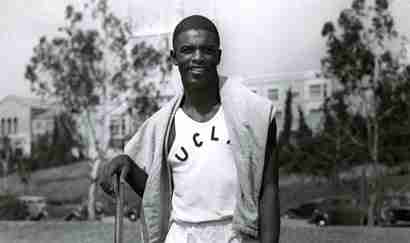
Major League Baseball unilaterally retired the number 42 in honor of Jackie Robinson, who broke the color barrier in 1947. His alma mater, UCLA has announced that the number 42 will be retired in all aspects of athletics in honor of the 75th anniversary of when he first set foot on campus.
At UCLA, Robinson became the school’s first four letter athlete. He played on the backfield of the UCLA Football team, making the Bruins team one of the first few integrated teams in the College Football. He was also a member of the Men’s Basketball team, the Baseball (of course) team and made his biggest mark in Track and Field, where he won the NCAA Long Jump at the National Track and Field Championships in 1940.
Those currently wearing 42 will be able to keep that number for the duration of their career in UCLA. We would like to commend the institution for this classy move and once again salute the great career of Jackie Robinson.
